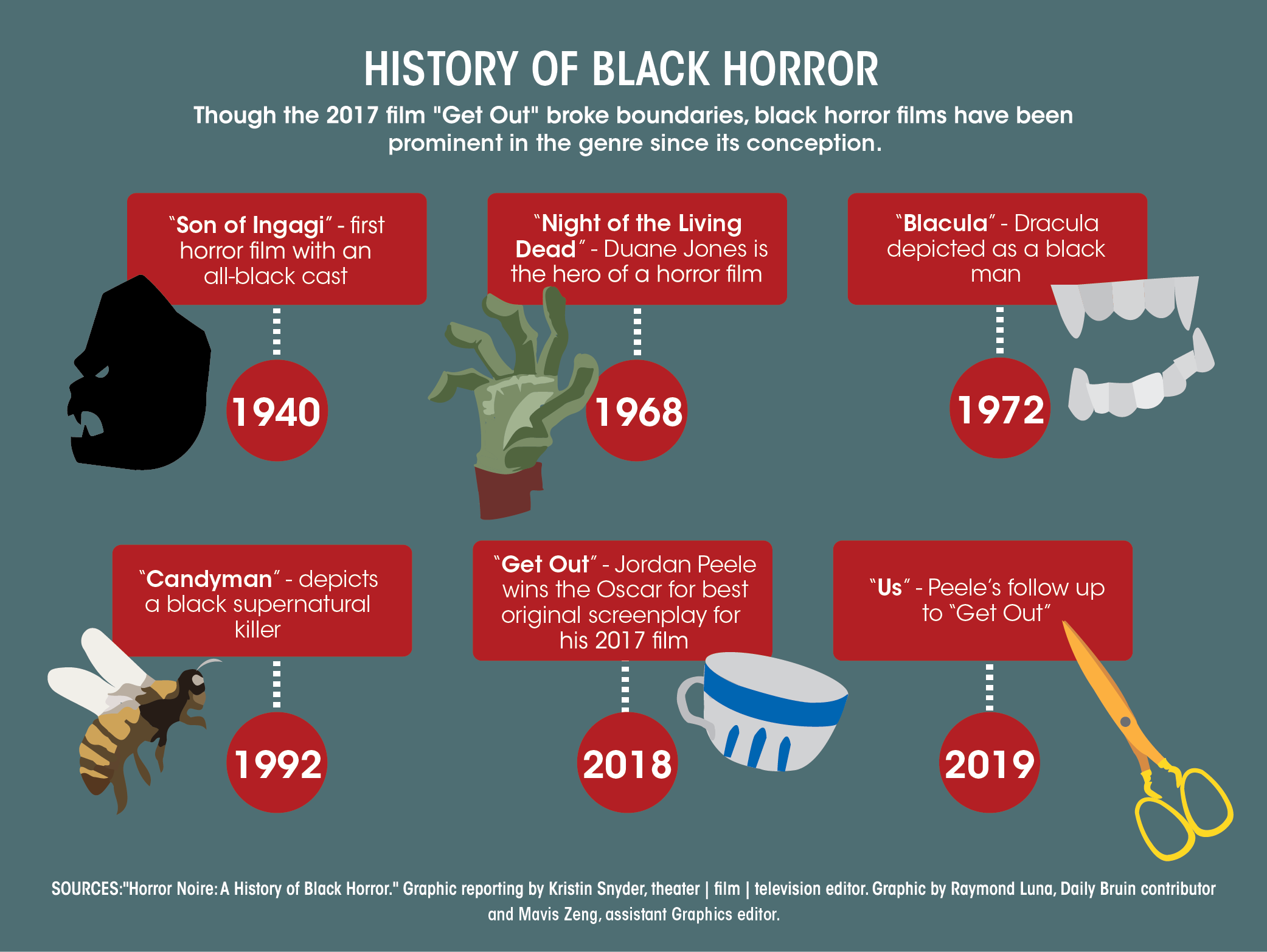Documentary brings in new narratives to spotlight black horror’s rich history


By Kristin Snyder
March 13, 2019 10:45 p.m.
On March 4, 2018, Jordan Peele accepted the Oscar for best original screenplay.
Soon after, Shudder, a streaming service dedicated to horror films, gave its own production team the green light to create “Horror Noire: A History of Black Horror.”
The documentary is based on the book “Horror Noire: Blacks in American Horror Films from the 1890s to Present” by Robin R. Means Coleman and features interviews with prominent filmmakers, actors and experts in the field. It considers how the genre has changed over the years, from the 19th century when black people were often portrayed by white actors in blackface to Peele becoming the first black screenwriter to win best original screenplay for “Get Out.”
As an executive producer of “Horror Noire,” African American studies professor Tananarive Due said her position as a lifelong horror fan, in addition to her work as an academic, aided her contribution to the film. Due’s class on “Get Out” went viral after Peele visited two of her lectures. His movie is currently her favorite horror film.
“(‘Get Out’) really is just a smart examination of how you can create monstrosity from racism and give viewers a lens to even understand it if you didn’t see it before,” Due said. “But if you’re black and you already knew that, it really pricks your deepest fears – whether it’s walking alone in the suburbs or being isolated.”
[RELATED: New class explores black horror genre’s themes of survival, racism]
Due’s parents were both prominent civil rights activists, and she said her mother dealt with a permanent sensitivity to light after a police officer threw a tear gas canister in her face. But horror movies provided a way for her mother to cope with her traumatic experience as an activist, and her love of the genre led to Due’s own obsession with horror.
“Those monster movies she raised me on – ‘Dracula,’ ‘The Mummy,’ ‘The Fly’ – were not about race at all, but they could be a stand-in for the real-life horrors she was facing in her life,” Due said. “She could sort of confront it and visualize it and go through the cycle of emotions.”
The civil rights movement and the trauma that accompanied it is addressed within “Horror Noire” as an integral aspect of black horror. The 1968 film “Night of the Living Dead” in particular was heavily influenced by the movement as Martin Luther King Jr. was assassinated around the time it was filmed. Sources in the documentary highlight its political nature – it features a black protagonist who kills white zombies, but is eventually murdered at the hands of a white mob. The documentary explores the impact of Jim Crow laws and the protests that influenced the politics of “Night of the Living Dead.”
Coleman said the interviewees in “Horror Noire” make their own points, but most of the examples were drawn directly from her book. Coleman said the sources complemented the history dictated by the documentary with their own personal relationships to the films discussed. For example, actress Rachel True stated that “Night of the Living Dead” was the first time she saw a noncriminal black character on screen.
It was important for “Horror Noire” director Xavier Burgin to ensure his film didn’t rely on individual interviews. Instead, he said he paired people together to encourage more casual conversation in a theater, adding in clips from the films they discussed. Seeing the conversation between instrumental figures in horror – such as Keith David, who acted in “The Thing,” and Ken Foree from “Dawn of the Dead” – helped to highlight those whose work may have been erased by history, he said.
“Most people wouldn’t even think that there was this type of longevity to black folks being a part of horror films and being a part of the cultural zeitgeist. Even myself as a filmmaker, I didn’t know that there were people doing this in the early 1900s,” he said. “(The film) is more about really championing what it means to be black and also enjoy these films.”
The documentary also features William Crain, the director of the 1972 film “Blacula,” which reimagines Dracula as a black man – a blaxploitation meant to be a social satire. Though “Blacula” was considered a hit at the time, Burgin said Crain did not receive the level of success he deserved, despite laying much of the groundwork necessary for a young filmmaker such as Burgin to work in the industry.
[RELATED: Screening, Q&A to dissect growing culture of full-immersion horror experiences]
Looking forward, Due said she hopes Peele’s success with “Get Out” will allow for black creators to have increased opportunities in Hollywood. However, Due said she is worried white creators may use black characters in their films in a way that perpetuates long-standing tropes, such as the black character being the first to die or existing to only sacrifice themselves for the white characters.
Peele has said his upcoming film “Us,” though it features black characters, is not explicitly about race. However, Due said it is still revolutionary for a horror film to feature a primarily black cast. Coleman said Peele’s continued success highlights the importance of black horror.
“We’ve always been included in the genre – not always in positive ways, but we have been there. I think what we have to look forward to is that horror, when it gets an Academy Award, … shows that there is an interest and respect of the genre, and right now Jordan Peele is making the most of that interest,” Coleman said. “He brings such high quality, which is absolutely essential to the success of the genre.”

